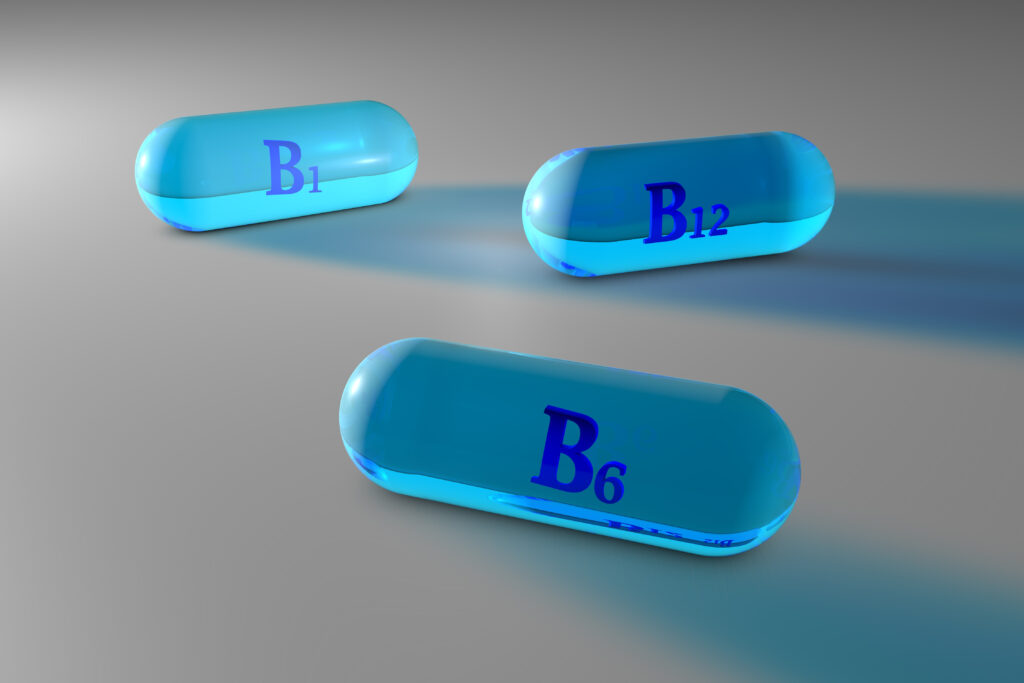Better Mood and Mental Health with B-Vitamins: B1, B6 and B12
A person’s mood and emotional state are influenced by health conditions and body compounds such as hormones, brain chemicals, and nutrients. The nerve-nourishing nutrients Vitamins B1, B6 and B12 have been found to play key roles in keeping a healthy mood as explained by the following:
Vitamin B1 (Thiamine) keeps the brain active and energized
The brain, being considered as a metabolically active organ accounting for over 20% of the body’s total energy expenditure, is selective when it comes to its source of energy. It almost exclusively relies on glucose obtained from the carbohydrates that we eat or are processed by the body. The process of converting glucose into brain energy essentially requires Vitamin B1 or Thiamine. This makes Vitamin B1 a crucial nutrient to keep the brain energized.
Vitamin B6 (Pyridoxine) helps the brain form the neurotransmitters, the brain chemicals responsible for one’s mood and mental function
Neurotransmitters are brain chemicals that influence mood and mental function. Vitamin B6 or Pyridoxine contributes to a healthy brain function by being an essential nutrient for the production of a number of neurotransmitters such as dopamine, serotonin, gamma-aminobutyric acid (GABA), noradrenaline and melatonin. Dopamine plays a role in reactions involved on how pleasure is felt while serotonin contributes to feelings of well-being. GABA is needed to regulate or calm brain activity and help reduce anxiety. Noradrenaline helps in coping with stress and in becoming active while melatonin is important in maintaining a healthy sleep-wake cycle.
Vitamins B6 and B12 (Cyanocobalamin) help clear away metabolic by-products linked with depression
Whenever the body processes or metabolizes protein, it produces a substance known as homocysteine. Homocysteine accumulation has been linked to the development of depression. It was reported that up to 30% of depressed patients were found to have elevated homocysteine levels. Thankfully, the body is able to naturally clear away homocysteine through reactions involving Vitamin B6 (Pyridoxine) and Vitamins B12 (Cobalamin). Maintaining healthy levels of Vitamins B6 and B12 may therefore be seen as a way to prevent homocysteine buildup.
Supplementation with B vitamins has been suggested to support a healthy mood and mental well-being
Seeing that B vitamins play numerous roles in keeping a healthy mood, it is no surprise that deficiencies of these B vitamins may lead to mood disorders. Studies have shown that deficiencies in B vitamins are associated with the development of various mood disorders and supplementation of B vitamins support a healthy mood.
In a study done on 35,000 older adults, it was shown that higher intakes of Vitamin B6 and B12 were associated with a lower risk of developing depressive symptoms by about 7 years. In another clinical trial, treatment with vitamin B complex for 3 months led to lower levels of perceived personal strain and sad mood compared to those who were not given vitamin B complex.
These studies suggest that intake of nerve-nourishing B vitamins is supportive of mental well-being given their various roles in multiple brain processes involved in regulating mood. Click here to learn more about B-vitamins.
For individuals feeling symptoms of depression, it is always best to seek professional help or to consult a doctor.
References:
Young LM et al. A Systematic Review and Meta-Analysis of B Vitamin Supplementation on Depressive Symptoms, Anxiety, and Stress Effects on Healthy and ‘At-Risk’ Individuals. Nutrients. 2019;11(9):2232. Published 2019 Sep 16. doi:10.3390/nu11092232
Stough C et al. The effect of 90 day administration of a high dose vitamin B-complex on work stress Hum Psychopharmacol. 2011;26(7):470-476. doi:10.1002/hup.1229
Kennedy DO. B Vitamins and the Brain: Mechanisms, Dose and Efficacy -A Review. Nutrients. 2016;8(2):68. Published 2016 Jan 27.doi:10.3390/nu8020068
Seppälä J et al. Association between vitamin b12 levels and melancholic depressive symptoms a Finnish population-based study. BMC Psychiatry. 2013;13:145. Published 2013 May 24. doi:10.1186/1471-244X-13-145
Sangle P et al. Vitamin B12 Supplementation: Preventing Onset and Improving Prognosis of Depression Cureus. 2020;12(10):e11169. Published 2020 Oct 26. doi:10.7759/cureus.11169








